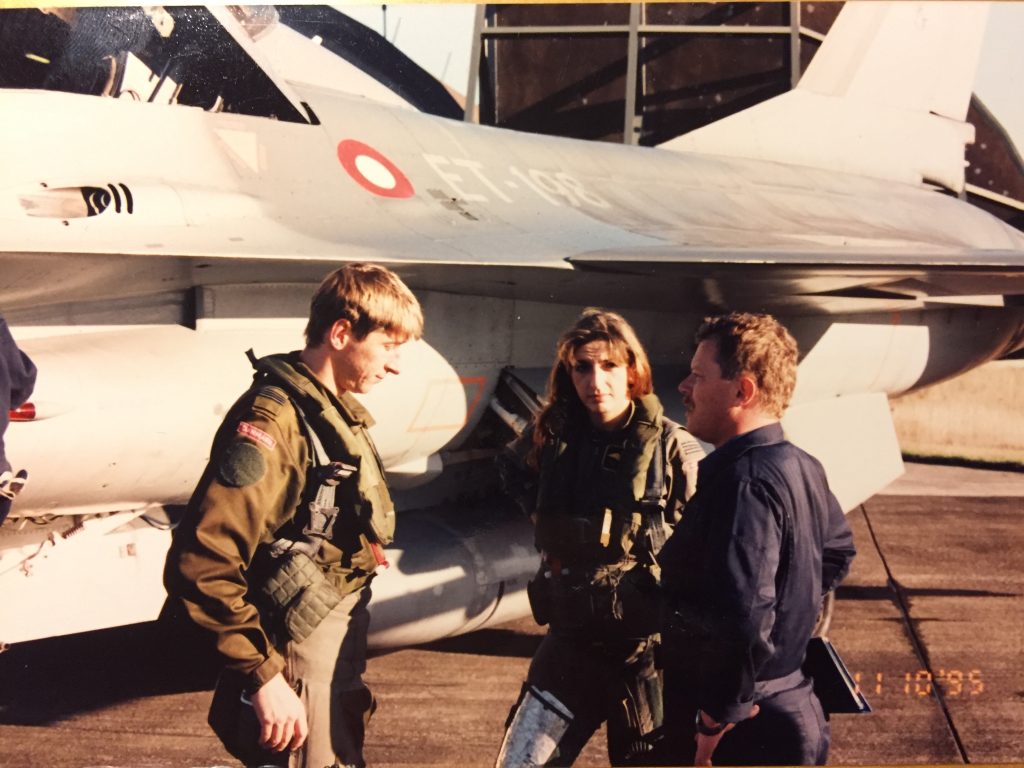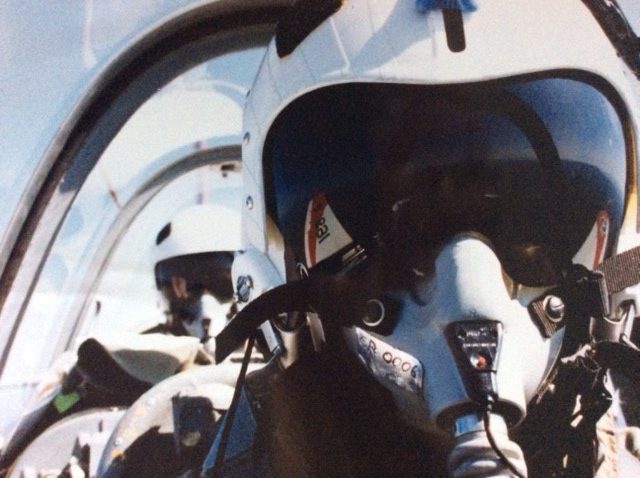Charlotte Pedersen was the first woman in Denmark’s military pilot programme. Now a board director and executive, she brings 35+ years of leadership in aviation, maritime, rail, and governance.
You were born in Denmark and chose a military career early on. Can you tell us about that chapter of your life?
Raised in a creative family, I followed an unconventional path into aviation. I joined the Air Force almost by accident—to skip a week of school for the entrance tests—but to my surprise I passed.
In 1989, I made history as the first woman in the Danish Air Force’s military pilot programme. Shortly after, another woman joined, and we built a lifelong friendship.
We trained intensively in the US with different military branches. Every flight felt like an exam. Fail one, and you were out. But we were young, determined, and living far from home. We gave it everything and both made it. I graduated top of the class, with distinction. Back in Denmark, I flew Search and Rescue helicopters until 2006. That chapter shaped everything in my career: resilience, leadership under pressure, and the value of teamwork and trust.

Do you recall a particular mission during your military service that left a lasting impression on you?
During my military service, we were called to evacuate a critically ill boy from my home island. En route to Copenhagen, our helicopter lost all electrical power—no lights or navigation. Using only basic instruments and a flashlight, we landed safely and got him to the hospital. Years later, in a local supermarket, a woman recognized me as the pilot. She hugged me—it was the boy’s mother. He had survived and was thriving.
After the military and a break as a full-time mom you explored finance and day trading. How did you transition to civilian work in Luxembourg?
I reentered the workforce as a Flight Operations Inspector at DAC, then pursued an MBA. A conversation with an investor led me to Luxaviation. The company then had four jets and 60 employees. Four years later, we had 250 jets and 1,800 staff. It was a fast-paced, strategic journey that perfectly matched my leadership and operational skills.
Looking back, how has your military and aviation experience shaped your professional journey and your vision for the future?
Military life taught me discipline, resilience, and crisis leadership—skills that shape every board and executive role I take today. Managing people in high-stakes situations taught me the value of trust, communication, and accountability. Crisis management made me calm in chaos, a skill I still rely on. These abilities helped me scale Luxaviation from a small team to a global operation. Now, in my board and advisory roles I apply the same clarity, structure, and long-term vision. My journey also deepened my commitment to lifelong learning, building on those core military lessons through my MBA, INSEAD board work, and adapting to new industries.
“Crisis management made me calm in chaos, a skill I still rely on”
Both the military and the transportation sectors tend to be male-dominated. How did you carve out your space and assert yourself in these environments?
I’ve often been the only woman in the room, but I focus on results and clarity. Leadership is earned through competence and vision, not gender. My style, which is shaped by military experience, is clear, structured, and long-term. I know how to anticipate rather than just react. I also value people management: knowing when to lead, guide, or give space. I lead with empathy, but also with clarity and rigour, setting high standards. In a male-dominated world, credibility is earned through competence, consistency, and vision. A clear strategic direction, backed by data and effective communication, makes leadership undeniable—regardless of gender. That’s what has allowed me to lead and grow organisations at the highest levels.

You serve on several boards. Is gender balance in governance a priority for you?
Gender balance in governance is a clear priority for me. Leadership should reflect the nearly equal split between men and women in the world. It’s not just about representation but also about performance and perspective. Diverse boards navigate complexity better and make stronger decisions. Qualified women with the right skills are available, but recruitment must actively seek and value them beyond a checkbox. Intentional, inclusive hiring brings out the best candidates. I support gender balance as part of building strong, forward-looking governance that truly reflects today’s world.
From your perspective, what are the biggest challenges currently facing the aviation sector?
Aviation faces overlapping regulations, environmental pressures, and supply chain issues. In Luxembourg, limited airspace and EU rules add to the complexity. While safety remains paramount, overlapping and fragmented regulations—especially in Europe—make it harder for operators to stay agile and competitive. Sustainability pressures are also mounting, with growing environmental expectations that outpace technological readiness in areas like sustainable fuels, electrification, and infrastructure. Increasing CO₂ taxes add further costs to an already low-margin industry. The business environment is tough, with ongoing supply chain disruptions affecting engine availability and aircraft manufacturing, still recovering from the pandemic. Passengers demand low prices and high service, but many issues affecting their experience like delays, air traffic control inefficiencies, staffing shortages, are beyond airlines’ control. In Luxembourg, these global challenges are intensified by airspace limits, cross-border air traffic control coordination, and complex EU tax and regulatory frameworks. Additionally, labour relations and union negotiations remain critical to maintaining operational stability.
Luxembourg is exploring innovations like medical drone transport. Where do you see the potential?
Medical drones and air mobility hold real promise. Luxembourg can lead—if strategy, infrastructure, and regulation align. I saw this succeed in Saudi Arabia, where I was the only aviation expert on a team that developed a nationwide aeromedical plan, and it was a great success. Here in Luxembourg, with our size and innovative spirit, we have a fantastic opportunity to become a model for next-generation aeromedical services, and I’d love to be part of that journey.
“Here in Luxembourg, we have a fantastic opportunity to become a model for next-generation aeromedical services, and I’d love to be part of that journey”
What advice would you give to young people who want to pursue a career in aviation?
Aviation is vast and dynamic—there’s something for everyone. It connects people and shapes the future. It’s also incredibly rewarding—you get to be part of something that connects people, moves the world, and often makes a real difference in people’s lives. Aviation welcomes talent from all backgrounds—and the future of the industry will depend on fresh ideas, new perspectives, and people who are ready to shape what comes next.

This article was published in the 6th edition of Forbes Luxembourg magazine.
Read more articles:
Responsibility Is The Quiet Force Behind Great Leadership
Luxembourg’s Industry Eyes GenAI: Optimism, Challenges And A Path Forward
Luxembourg Faces Wealth Decline Amid Global Surge

